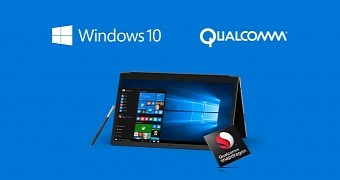Microsoft has already unveiled the first Windows 10 on ARM devices, or Always Connected PCs, as the company itself calls them, but early reviews are not as good as expected, to say the least.
The Redmond-based software giant, however, says you shouldn’t hurry to call Always Connected PCs a flop because what you see is just the beginning and together with its partners, more devices should be launched in the future. And, more importantly, even though these laptops are all about Qualcomm’s Snapdragon chips right now, that won’t be the case in the future.
“We don't equate ‘Always Connected PC’ with Qualcomm,” Microsoft Windows general manager Erin Chapple was quoted as saying. “We’re about choice in the ecosystem and working across our partners.”
Chapple, however, says Qualcomm will continue to be part of its Always Connected PC push, so new chips will also be featured on devices. Earlier this year, Microsoft suggested that Windows 10 on ARM will make its way to a PC-optimized version of the Snapdragon 845 mobile chip as well later in 2018.
All eyes on Build 2018
Microsoft says that while HP, Lenovo, and ASUS launched their Always Connected PCs already, it also has its own such device on the market. “We also have our Surface Pro LTE, which we consider our first Always Connected PC.”
Part of Microsoft’s strategy to make Windows 10 on ARM better is the launch of Redstone 4, also known as the Spring Creators Update, which comes with several improvements for Always Connected PCs.
“You will see [ACPC] performance improvements between the Fall Creators Update and the RS4 updates that we’ve been delivering [through the Windows Insider program],” Chapple explained.
Without a doubt, Microsoft is fully committed to Always Connected PCs, and the upcoming Build 2018 developer conference will certainly bring exciting news on this front. One of the highlights is likely to be an x64 software developer kit that could bring more apps to Windows 10, eventually helping the Microsoft Store grow faster.

 14 DAY TRIAL //
14 DAY TRIAL //